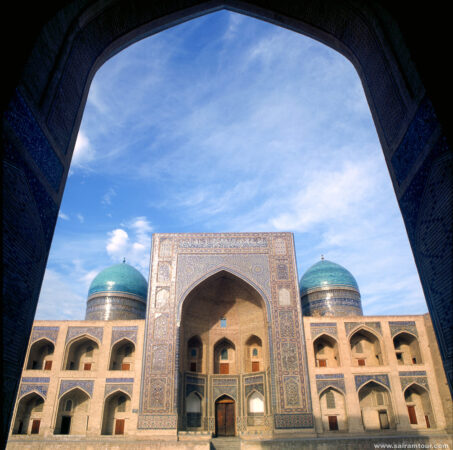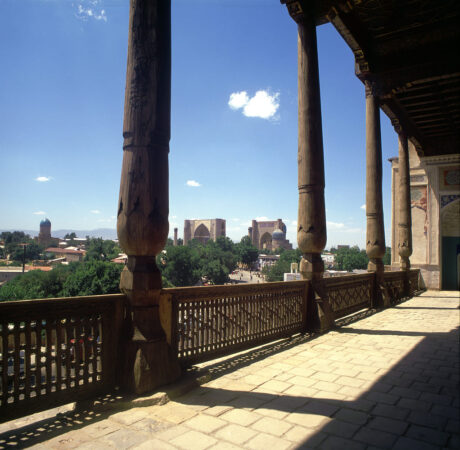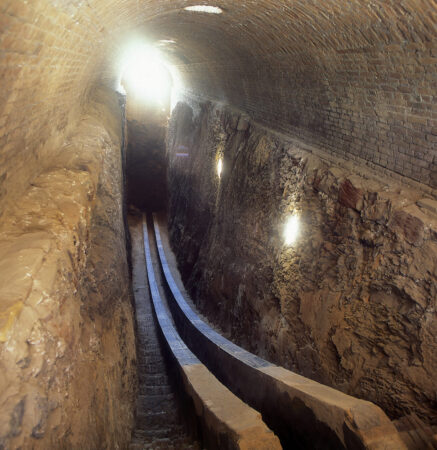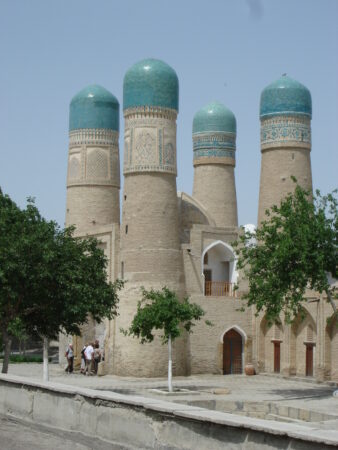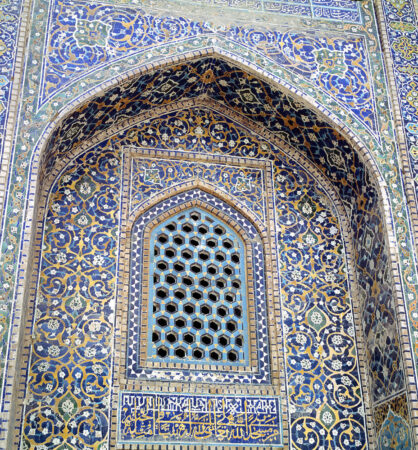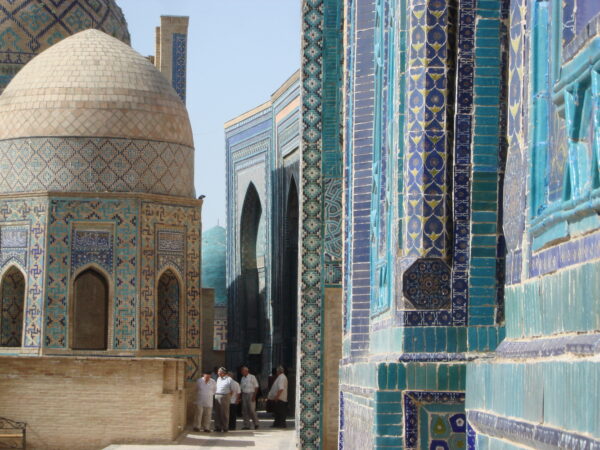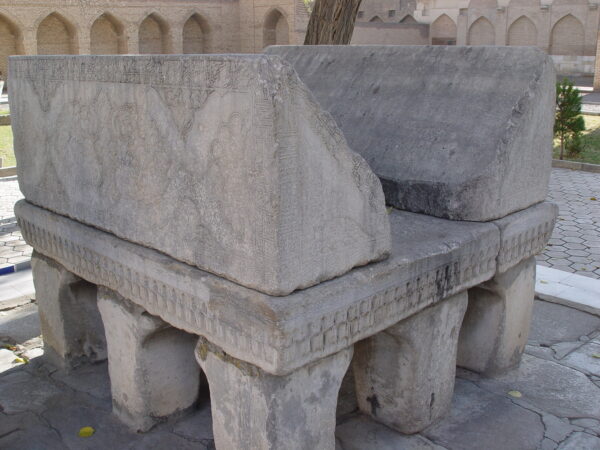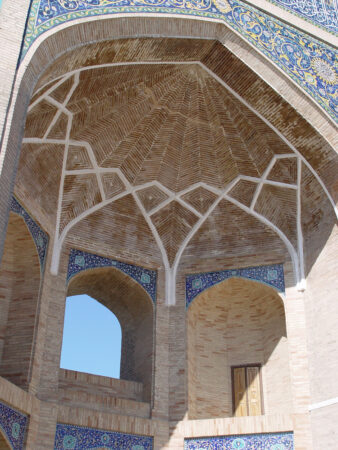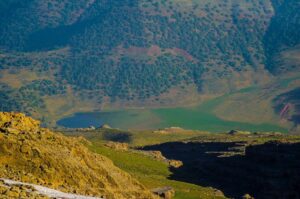Unique pilgrimage tour to Sufi Uzbekistan
Описание
Embark on a spiritual journey through Uzbekistan, a country rich in Islamic heritage and Sufi traditions. This tour will guide you through the sacred sites of Samarkand and Bukhara, where revered saints, scholars, and mystics left their mark on history.
Sufism, the mystical branch of Islam, flourished in Central Asia, making Uzbekistan a center for spiritual seekers. This pilgrimage tour offers a profound experience of Islamic history, the teachings of great Sufi masters, and the tranquility of centuries-old mosques and mausoleums.
During this journey, you will visit the mausoleums of Bahauddin Naqshbandi, Imam Al-Bukhari, and other sacred landmarks that continue to inspire pilgrims from around the world.
План тура
Day 1: Tashkent
Arrival in Tashkent: Meet and greet at the airport. Transfer to hotel and check-in.
Visit to Hazrati Imam Complex: Home to the famous Quran of Caliph Uthman.
City Tour:
Barak-Khan Madrasah
Tillya Sheikh Mosque
Mausoleum of Hazrat Abu Bakr Kaffal Shashi
Namaz :
Dhuhr at Hazrati Imam Complex
Asr at Hazrati Imam Complex
Maghrib at the Islamic Civilization Center
Isha at a local mosque
Visit to Imam Al-Bukhari Islamic Institute
Dinner and Overnight: Transfer to a restaurant for dinner. Overnight stay in Tashkent
Day 2: Tashkent - Samarkand
Namaz:
Fajr before breakfast.
Breakfast:
Light early breakfast at the hotel.
Transfer:
Transfer to the train station.
Departure by high-speed train “Afrosiab” on the route Tashkent - Samarkand.
Arrival in Samarkand.
Visit:
Imam al-Bukhari complex - one of the most important shrines of the Islamic world.
The memorial complex of Imam Ismail al-Bukhari - a great hadith scholar, who was born in Bukhara in 810 and died in 870 in the village of Khartang (Chelak district of modern Samarkand region).
His burial place has become one of the most sacred pilgrimage centers for Muslims from all over the world.
Lunch at a local restaurant.
Namaz:
Zuhr at Imam al-Bukhari's compound.
Transfer:
Transfer to Imam Maturidi complex.
Visit:
Imam Maturidi Complex is one of the holy places of Samarkand. Mausoleum of Imam al-Maturidi - an outstanding Islamic philosopher and theologian, fighter for the purity of Islamic doctrine. Chokardiz Cemetery is a historical burial ground where famous Islamic scholars including Imam Nasai, Burhaniddin Marginani and other theologians are buried. In the past, the site was a military fortress, which is where the name comes from: “Chokar” means “army” and “Diza” means “fortress”.
Transfer:
Transfer to the necropolis of Shahi-Zinda.
Excursion:
Shahi-Zinda necropolis (IX-XIV and XIX centuries) is one of the most sacred places of pilgrimage in Uzbekistan. Entrance through the majestic gate and climb the staircase of 70 steps.
Alley of almost 20 mausoleums decorated with unique carved pottery, which is an example of the best architecture of Central Asia.
Visit:
Registan Square is a world-famous landmark of Samarkand, surrounded by three majestic madrassas.
During the time of Amir Timur, six major trade routes crossed at Registan Square.
Ulugbek Madrasah (XV century) is the oldest building of the square, decorated with blue tiles.
Sher-Dor Madrassah (XVII century) - repeats the style of Ulugbek Madrassah, but decorated with images of tigers.
Tillya-Kari Madrassah (XVII century) - completes the ensemble of the square and includes a built-in mosque covered with more than 1000 m² of gilded decoration.
Today, Registan Square is considered the most beautiful square in Central Asia.
Namaz:
Asr at the local mosque (optional at the Tilla-Kari mosque).
Transfer:
Transfer to the hotel, accommodation.
Free time for rest before dinner.
Namaz:
Maghrib at the hotel.
Dinner at a local restaurant.
Namaz:
Isha at a local mosque.
Overnight stay:
Overnight stay at a hotel in Samarkand.
Day 3: Samarkand
Namaz:
Fajr at the hotel.
Breakfast:
Breakfast at the hotel.
Visit:
Siab Bazaar is the largest market in Central Asia and one of the most visited places in Samarkand after Registan. Founded in ancient times, it was part of the Great Silk Road and served as a trading point between the largest cities of the region - Tashkent, Shakhrisabz and Bukhara. Today, the bazaar area exceeds 70 thousand square meters, offering tourists traditional oriental goods, spices and souvenirs.
Visit:
Bibi-Khanum Mosque is one of the most important monuments of Samarkand. In the XV century the mosque was considered one of the largest and most majestic in the Islamic world. By the middle of the 20th century only ruins remained, but most of the mosque had been restored.
In the center of the courtyard is a stone Quran stand (Muskhaf Usman r.a.) carved from marble and dating back to the time of Amir Timur.
Visit:
Gur-Emir Complex - the resting place of Amir Timur. A magnificent portal and a distinctive blue dome decorate the mausoleum. Two sons and two grandsons of Amir Timur, including Ulugbek, also rest here. The ornamental painting of the dome is particularly impressive, creating a mesmerizing glow in the evening.
Lunch:
Lunch at a local restaurant.
Namaz:
Zuhr at a local mosque.
Transfer:
Transfer to Ulugbek Observatory.
Visit:
Ulugbek Observatory is one of the largest astronomical centers of the medieval East. It was built in the 1420s by the great astronomer, mathematician and ruler Ulugbek. Prominent Islamic scholars such as Giyas al-Din al-Kashi, Ali Kushchi and Ulugbek himself worked in the observatory. It was destroyed in 1449 and rediscovered by archaeologists in 1908.
Visit:
Hazrat Khoja Ubaydullah Ahror Waliy (QS) Complex is a spiritual center associated with the history of Uzbekistan. Khoja Ahror was a leader of the Naqshbandiyya Sufi order and influenced the political and spiritual life of the region. He was recognized as the spiritual adviser of many rulers of his time. He achieved the abolition of heavy taxes in Maverannahr and once prevented a bloody battle between the rulers of Samarkand, Fergana and Tashkent. Performing Maghrib namaz at the mosque of Hazrat Khoja Ubaydullah Ubaydullah Ahror Waliy (QS).
Namaz:
Asr in the compound.
Transfer:
Return to the hotel.
Namaz:
Maghrib at the hotel.
Dinner:
At a local restaurant or at the hotel.
Namaz:
Isha at local mosque.
Overnight stay at a hotel in Samarkand
Day 4: Samarkand - Bukhara
Namaz:
Fajr before breakfast.
Breakfast:
Breakfast at the hotel.
Move:
Transfer to the railway station.
Departure by high–speed train ”Afrosiab" on the route Samarkand - Bukhara (departure at 09:40, arrival at 11:20).
Arrival in Bukhara Sharif.
Transfer:
Transfer to a local restaurant, lunch.
Visiting:
The Bolo House Mosque is one of the historical sights of Bukhara.
Namaz:
Zuhr at the Bolo House Mosque.
Excursion:
The Bolo House Mosque is the only surviving mosque on the former Registan Square. It was the main Friday mosque of the Emir of Bukhara until 1920. On holidays, the area from the Fortress Arch to the mosque was covered with precious carpets, which the emir walked through during prayer.
Visiting:
The historical quarter of Imam al-Bukhari is the place where the great Hadith scholar Imam al-Bukhari was born. The street is located in the central historical part of Bukhara. According to historians, Imam al-Bukhari was born and lived near Khoja Zainiddin's house (now the Khoja Zainiddin Mosque is located on this site). Visit to the house and mosque.
Excursion:
Poi-Kalon architectural complex is one of the key monuments of Bukhara. Kalon Minaret (12th century) - has been used as a lighthouse for caravans for centuries. Kalon Mosque (XV century) is one of the largest Friday mosques in Central Asia. Mir-i-Arab Madrasah (16th century) is one of the few operating madrasahs where the study of the Koran is still conducted (entrance inside is limited).
Namaz:
Asr at the Kalon Mosque.
Visiting:
Ulugbek Madrasah (XV century) is one of the three madrasahs built by this great scientist and ruler.
Transfer:
Transfer to the restaurant, dinner.
Namaz:
Maghreb and Isha at the local mosque.
Transfer:
Return to the hotel.
Overnight in the best hotels in Bukhara
Day 5: Bukhara - Cizhduvan
Prayer:
Fajr before breakfast.
Breakfast:
Breakfast at the hotel.
Move:
Departure to Gijduvan district, the birthplace of one of the seven great Naqshbandiyya masters.
Visiting:
The complex of Hazrat Khoja Abdulkhalik Gijduvani (QS) (1103-1179), the founder of the independent mystical school in Transoxiana, known as Khajagan (The Path of Mentors). He continued the spiritual teachings of Yusuf al-Hamadani (QS) and formulated the eight basic rules of the Khajagan tariqa.
Visiting:
The complex of Hazrat Khoja Arif Rivgari (QS), one of the most famous Sufis in Central Asia. He was a worthy follower of the Khajagan tradition and became the head of the spiritual brotherhood after the departure of Khoja Abdulkhalik Gijduvani (QS). He is the second mentor of the Seven great masters of Bukhara Sharif.
Transfer:
Transfer to the restaurant, lunch.
Namaz:
Zuhr in the complex of Hazrat Khoja Mahmoud Anjir Fagnavi (QS).
Visiting:
The complex of Hazrat Khoja Mahmoud Angir Fagnavi (QS) is an outstanding Sufi known for his school of Fiqh and recognized as the spiritual authority of Transoxiana. He was the first to introduce collective dhikr in accordance with the religious requirements of his time. When asked about the innovations, he replied: “May the sleepers awaken.” He is the third of the Seven Great Masters of Bukhara.
Visiting:
The complex of Hazrat Khoja Ali Romitani (QS) is one of the most revered spiritual mentors of the Khajagan Tariqa. He possessed deep spiritual wisdom and charisma. Due to his popularity and sanctity, he received the title “Azizon” (“venerable Sheikh"). He wrote the famous admonition: “Be careful about two things - when you talk and when you eat.” He is the fourth of the Seven Great Masters of Bukhara.
Visiting:
The complex of Hazrat Khoja Muhammad Boboi Samasi (QS) is an outstanding Sufi mystic, a follower of the traditions of the Khajagan school. He was a student and successor of Khoja Ali Romitani (QS). He made a significant contribution to the development of the Khajagan school by developing the concepts and techniques of tasawwuf. He is the fifth of the Seven Great Masters of Bukhara.
Visiting :
The complex of Hazrat Sayyid Amir Kulal (QS) Sayyid Amir Kulal (QS) is one of the outstanding spiritual mentors of the Khajagan school, which is part of the chain of spiritual succession (silsil) and occupies the sixth place in this chain. His nickname “Kulal" means “potter”, as he was engaged in this craft. Also known as Shamsuddin. They called him:
- “The Rose of the qualities and attributes of the Prophet.”
- “The Far Lot is the tree of striving for the highest levels of the spiritual path.”
- “The owner of the throne of spiritual guidance.”
- “Attracting heavenly blessings.”
- “A teacher who reveals the secrets of divine knowledge with his holy breath.”
Sayyid Amir Kulal (QS) was recognized as a mujaddid (sharia renovator), master of the tariqa (spiritual path), builder of the haqiqa (truth) and mentor of the khaliq (creation). His contemporaries said of him, “The Saints of Craftsmanship are the Masters of all Saints.” He was born in the village of Sukhar, located two miles from Bukhara.
Namaz:
Asr in the Sayyid Amir Kulala Complex (QS).
Visiting :
The Lyabi House complex is one of the central squares of Bukhara, located in the southeastern part of the city. The architectural ensemble was created in the XVI–XVII centuries. The square has an irregular polygonal shape. The Nadir Divan Begi Madrasah is located in the eastern part. In the western part, opposite the madrasah, there is the khanaka Nadir Divan Begi, a Sufi monastery with a domed hall and two-story cells. The main facade is decorated with elegant mosaics and intertwining ornaments.
Transfer :
Transfer to the restaurant, dinner.
Namaz:
Maghreb and Isha at the local mosque.
Transfer :
ВоReturn to the hotel.
Ночлег в лучших отелях Бухары
Day 6: Bukhara
Namaz:
Fajr before breakfast.
Breakfast:
Breakfast at the hotel.
Visiting:
Mausoleum of Hazrat Imam Muhammad Bahauddin Naqshband (QS), the main representative of Sufism in Central Asia of the 14th century. His name "Naqshband" means "coiner", and it was from this nickname that the name of the Sufi tariqa Naqshbandiyya came. This complex is one of the most sacred places for followers of Sufism.
A day dedicated to spiritual practices:
Spending the day in dhikr, etiqaf, prayer, fasting (saum) and other Sufi practices in accordance with the teachings of the Naqshbandiyya tariqa.
Namaz:
Zuhr, Asr, Maghreb and Isha in the complex of Bahauddin Naqshband.
Transfer :
Return to the hotel.
Overnight stay:
Completion of the program
Day 7: Bukhara - Tashkent
Namaz:
Fajr before breakfast.
Breakfast :
Breakfast at the hotel.
Move:
Transfer to the railway station. Departure by high-speed train “Afrosiab" to Tashkent.
Arrival in Tashkent:
Lunch at a local restaurant. Free time for shopping for those who have enough time before departure.
Transfer:
Transfer to the airport and departure to your homeland. For passengers with a late departure, transfer to the hotel, where they can relax before departure.
When ready, transfer to the airport

